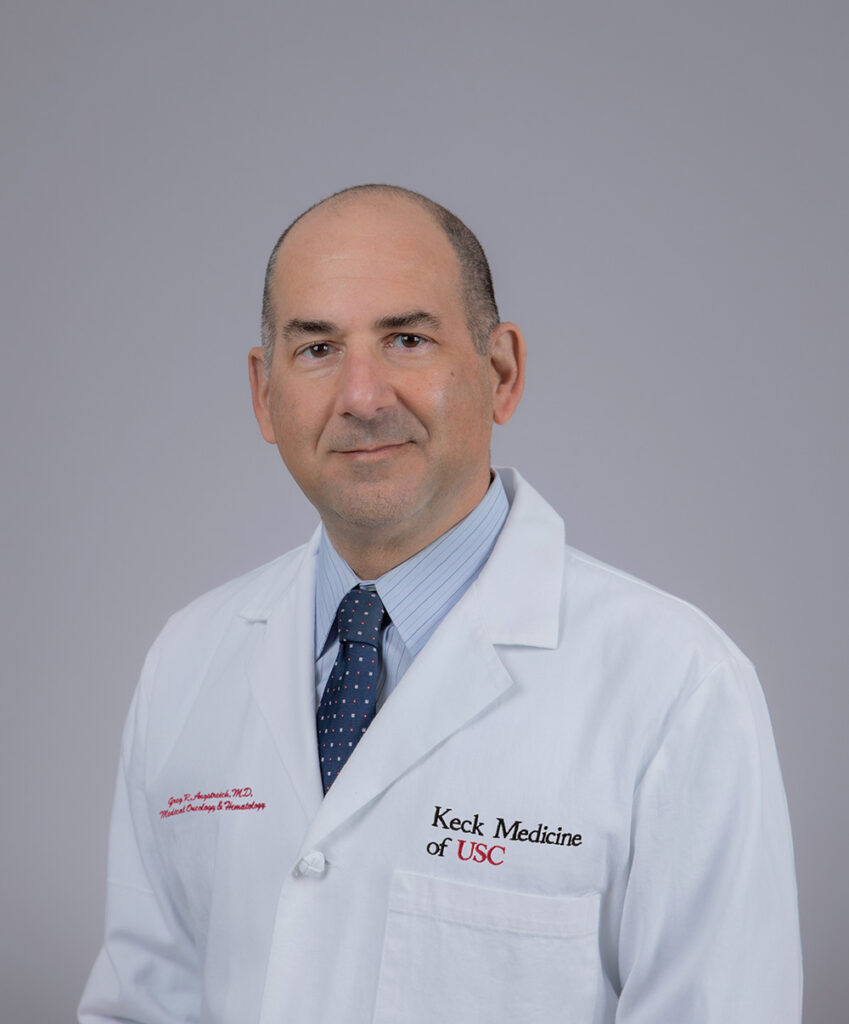
What makes a patient likelier to want another opinion? A Keck Medicine of USC hematologist-oncologist shares his insights.
Most patients typically do not request second opinions. There are, however, certain conditions that often prompt a patient — or even the patient’s own physician — to want an additional opinion.
Over the course of his long career, Greg R. Angstreich, MD, a medical oncologist and hematologist with USC Norris Comprehensive Cancer Center, part of Keck Medicine of USC, has observed key factors that motivate patients — especially those diagnosed with cancer — or their physicians to seek a second opinion.
Rare diseases warrant second opinions.
Diseases without long-established standards of care are more likely to need specialty expertise. Sarcomas, for instance, aren’t common and usually require treatment from a sarcoma specialist, says Angstreich, who is also a clinical professor of medicine at the Keck School of Medicine of USC.
Hematological malignancies like leukemia require distinctive expertise, too — especially for certain patients. “Older patients with these malignancies are often not great candidates for typical chemotherapy approaches,” Angstreich points out. “They often need to see a particular specialist, and they might also look for a physician with access to a clinical trial on blood cancers specifically in older patients.”
While some types of cancers — like prostate and kidney cancer — have better established standards of care, bladder cancer is one cancer for which treatment is less established and therefore might prompt a second opinion, especially if the treatment plan requires a complex surgical operation.

Speaking of clinical trials…
Often, patients consult another physician to inquire whether the doctor knows of any clinical trials that could help. USC Norris Comprehensive Cancer Center’s ongoing clinical research is a big reason why physicians often refer their patients there, Angstreich says.
He looks both in-house and externally to locate clinical trials for patients. If USC Norris Comprehensive Cancer Center doesn’t have the trial he’s looking for, he will help a patient find trials happening elsewhere.
“There are people who have been treated with multiple lines of chemotherapy or immunotherapy, for instance, who are running low on options through our office,” he says. “I’ll help identify a clinical trial for them at a different facility.”
Life-changing decisions
Patients weighing multiple treatment options are more likely to seek a second opinion if some treatments would result in significant alterations to the treatment plan.
Treatment for breast cancer is a primary example, says Angstreich. Breast cancer patients usually have numerous therapies to choose from, ranging from chemotherapy to surgery or radiation. “Some treatments, like a mastectomy or a lumpectomy, will irreversibly change your anatomy or appearance,” Angstreich says.
Treatment for bladder cancer is another example, as some patients face the decision to undergo a urostomy.
“People understand that these treatments will change their life in a major, irreversible way,” he says. “Because of this, they’re going to seek out surgeons who have a lot of experience performing these procedures, or they’re going to research other treatment options to try to avoid that type of surgery.”
“If there are multiple, reasonable options for treatment, I would definitely encourage people to think about getting a second opinion,” he adds.
Physicians themselves make the call.
Angstreich himself initiates a second opinion if he knows a patient should see another specialist. “Second opinions are most important with complex surgeries,” he explains. “I’ll usually generate those without the patients even needing to ask.”
The same is true when it comes to exploring clinical trials. “Clinical trials are always something we try to discuss with patients here,” he adds, whether it’s a trial at USC Norris Comprehensive Cancer Center or somewhere else.
Motivated by loved ones
Patients who pursue a second opinion aren’t necessarily better educated, wealthier, older or younger: they are simply better researched, or they are encouraged by family and friends to get a second opinion.
“It’s not so much the patient’s educational or financial background that generates the desire for a second opinion; a lot of the time, it’s the involvement of family members who have done research on their own,” Angstreich observes. “Patients who come in on their own are generally not the ones seeking a second opinion; oftentimes, it’s a spouse, kids or friends who are asking the question.”
He adds, “We have such easy access to information and clinical trial databases today that anyone who does a little research might seek out a second opinion specifically for one of our unique clinical trials.”
Putting yourself in the patient’s shoes
The reasons for wanting a second opinion are personal, and Angstreich respects and supports each patient’s choice.
“If people seek a second opinion or ask me what I think about it, I usually encourage them to get one,” he says. “I tell them I would probably do the same thing if I had their diagnosis and that it’s a good idea. I tell them they should proceed without any concerns about impacting our relationship because our relationship is based on doing the right thing for them, not on my own ego as a medical oncologist.”
“Getting a second opinion is part of the decision-making process,” he concludes. “If an oncologist discourages you from getting a second opinion, that’s exactly when you should seek a second opinion.”
Topics
